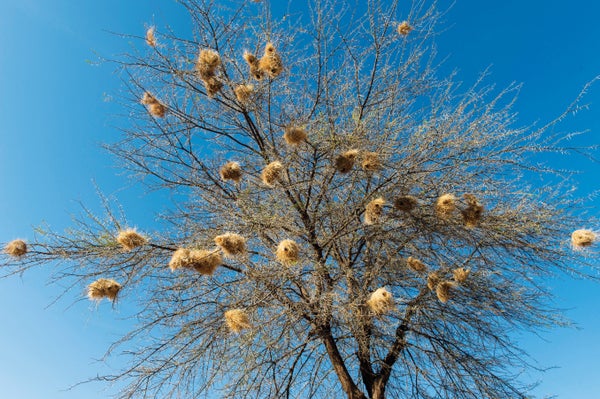November 5, 2024
2 min read
These Bird Nests Show Signs of an Architectural ‘Culture’
Culture may play a role in how birds build collectively in the Kalahari Desert
White-browed Sparrow-Weaver nests and roosts.
Wolfgang Kaehler/Alamy Stock Photo
From long and winding migration flights to intricate songs and clever tool use, many bird behaviors are known to be transmitted socially and persist across generations—what scientists define as animal “culture.” Now a study suggests culture might play a role in avian architecture, too.
Researchers analyzed more than 400 structures built by 43 different groups of White-browed Sparrow-Weavers in the Kalahari Desert in southern Africa. These birds live communally, and the entire cohort works together to build a nest and multiple roosts from grass. The group’s dominant female then lays eggs in the nest, which has a long, tubelike entrance. Individual birds slumber nearby in the U-shaped roosts, which have both an entrance and an exit.
The scientists found that different gatherings of birds, even those living only a few meters from one another, built very different tube structures. The biggest difference was in “how short or long the structures are,” says study lead author Maria C. Tello-Ramos, a cognitive ecologist at the University of Hull in England. Tube width also varied between groups. Furthermore, each group maintained the same architectural style over time—and when outsiders joined, they adapted to this style.
On supporting science journalism
If you’re enjoying this article, consider supporting our award-winning journalism by subscribing. By purchasing a subscription you are helping to ensure the future of impactful stories about the discoveries and ideas shaping our world today.
To examine why the groups built differently, the team analyzed factors that can determine a nest’s size and shape for a given bird species: weather conditions, tree height, individuals’ body size and genetic…
Read the full article here

